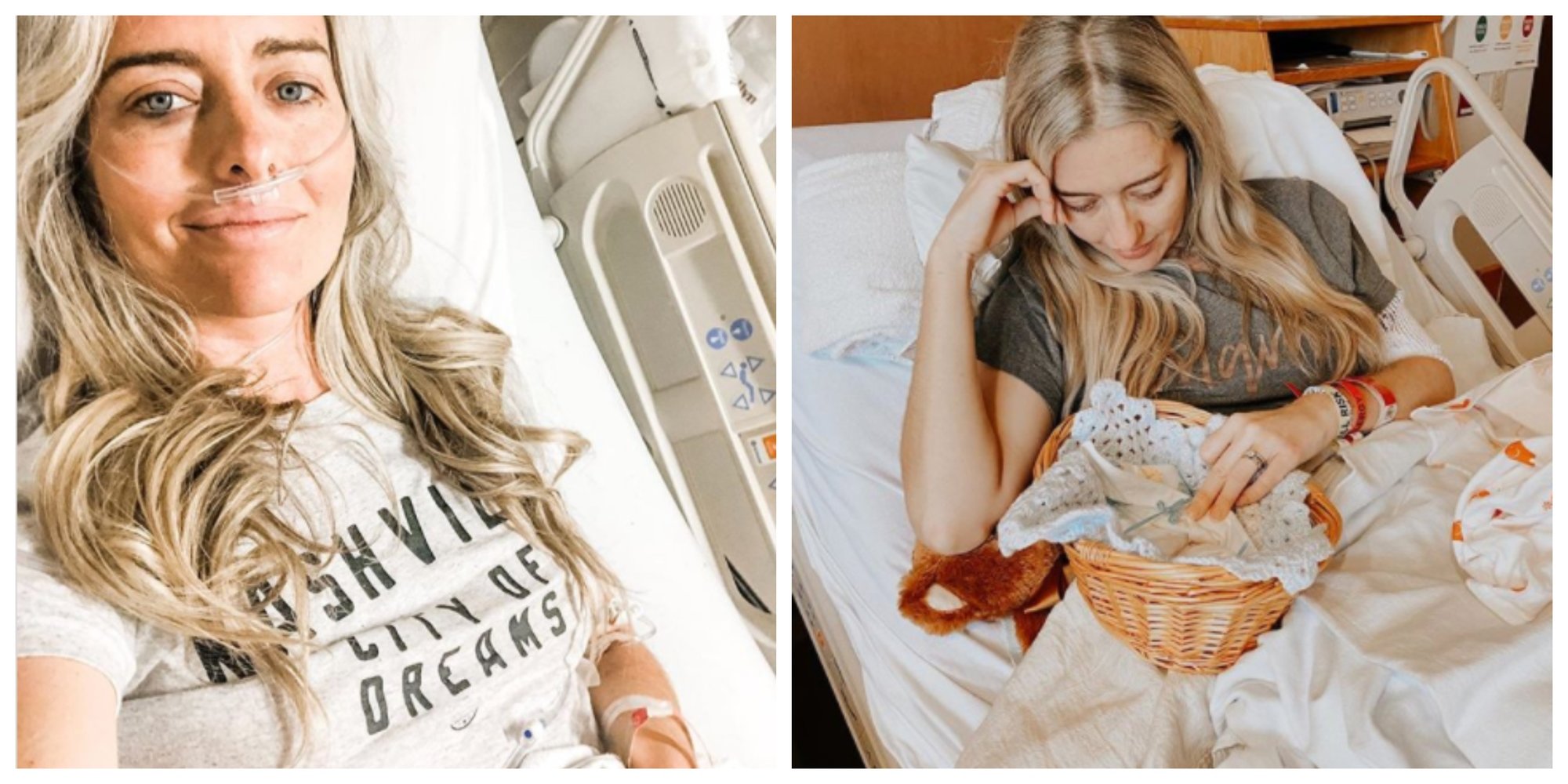
TRIGGER WARNING: This post contains information about stillbirth and infant loss, which may be triggering to some.
Thirty-three-year-old Ashley LeMieux of Phoenix, Arizona, was 16 weeks along in her pregnancy when she was rushed to the hospital. The author of Born to Shine, a story of LeMieux losing her children in an adoption battle, was fighting sepsis. Her body was battling an extreme reaction to infection, caused by an undetected kidney infection that spread to her blood. This would be a precarious position for any pregnant woman, but the ongoing coronavirus pandemic made things even more complicated. Because of hospital regulations, LeMieux's husband, Mike, wasn't permitted into the delivery room with her — and when she eventually suffered a pregnancy loss, she did so alone.
Speaking with CafeMom, LeMieux says she found out she was pregnant during the first week of January.
It was a welcome surprise. "Everything changed for my husband and I," she says.
"It was a joy that we hadn't felt for a very long time and from day one I felt so connected to the baby who was growing inside of me," she continues.
She was so smitten with pregnancy that she says she didn't even mind the morning sickness.
"I knew my constant nausea and exhaustion was because my body was working hard to bring new life into the world," she says.
And in a sweet twist of fate, her sister found out she was pregnant too. "The excitement of raising our babies together was something we dreamed of our entire lives," LeMieux notes.
It should have been a time of cautious optimism, but at 16 weeks, things started to fall apart.
About 8 p.m. March 20, LeMieux was experiencing major body aches that started in her legs.
"They hurt so badly that I had my husband rub them as hard as he could," she recalls. Soon, the pain started to radiate from her back and pelvis — something was wrong.
A week before, she was cleared of a bladder infection during an appointment with her obstetrician.
So, it didn't seem likely to LeMieux that this was the issue. And "because I didn't have any cramping, I knew the baby was okay," she says. "Something was happening in my body."
LeMieux was nervous. She wanted to go to the hospital, but given the coronavirus outbreak, "going to the ER didn't feel safe," she tells CafeMom.
The pain, however, was unrelenting. Around midnight, her husband went to the gas station to pick up some ibuprofen because LeMieux felt like she had a fever. "And by the time he got back, I was screaming in pain," she recalls.
It was time to call an ambulance.
The pain was so severe that LeMieux couldn't even walk. At the hospital, her blood was taken, and she was taken to get an ultrasound — ASAP.
"That was the first time I was separated from my husband," she recalls. "We were told he wasn't allowed anywhere besides the ER, due to safety precautions from COVID-19. Laying on the ultrasound table without him by my side was terrifying. I prayed that the baby was OK."
After the ultrasound was over, her doctors wouldn't tell her the results "and [then] wheeled me back to be with my husband, where we waited for the doctor to come and tell us what was happening in my body."
Her doctor assured her the baby was "great." She recalls, "We were so relieved and overjoyed."
But he did have bad news. LeMieux had two kidney infections that were causing sepsis.
"I was close to kidney failure and had a very dangerous amount of infection in my bloodstream," she says. Her doctors wanted to admit her, but there was even more bad news: Her husband couldn't come.
"Being wheeled away from my husband felt like somebody had cut off my oxygen supply," she continues. "It felt like I was in a slow motion movie, wanting to make it all stop and go have him hold me, but knowing that I needed quick medical attention so I had to leave him. It was one of the loneliest times I've ever had."
The next morning, LeMieux's condition got worse.
Her blood pressure dropped significantly, and she could hardly breathe. "Half of my body went numb, and I truly didn't know if my baby or myself was going to make it, she recalls.
LeMieux was going into septic shock and was screaming from the pain. Her doctors managed to get her pain and body under control, but she begged them to run another ultrasound.
"The OB came and said they were going to do some tests to make sure I hadn't lost amniotic fluid, but that they didn't want to do another ultrasound if they didn't have to," she says. "The test came back great, and they said the baby was OK. It was me who they were worried about."
The next day, LeMieux was still losing blood.
She again asked for an ultrasound, but her doctors still were reluctant to perform one. They chose to run a doppler ultrasound to give LeMieux some piece of mind, but when they ran the test later that night, the technician couldn't find a heartbeat.
"She told me dopplers are harder to get reads on," but the lack of a heartbeat caused them to finally grant LeMieux her ultrasound.
"That's when I knew something was wrong," she remembers. "I looked at the screen, and the heartbeat line was flat. I told them to tell me what was happening, and the technician said he wasn't allowed to — only the doctor could."
Finally, her OB told her that the baby didn't make it.
Her doctor also told LeMieux that it was up to her how she would deliver, but it was something they could decide once her body recovered from her infection. The next morning, however, the decision would be made for her.
Her son, Jayce Michael LeMieux, was born at 9:40 a.m. March 27, "all alone in an observation room that only had a curtain to separate me from the rest of the patients," she remembers. "My baby came quickly. I delivered him alone. Screaming, sobbing, begging for it to not be real. And then I waited for an OB and nurse to rush me over to labor and delivery."
Soon thereafter, doctors told her that her husband could visit.
Family and friend also came to visit.
They also weren't allowed to go inside the hospital, so they did the next best thing.
"They came to my window at the hospital and brought signs to let me know I wasn't alone," she recalls. "Even though we couldn't touch each other, it just felt so good to know that they were there, and to see their faces after having gone through such a hard loss by myself."
Despite these moments of lightness, the mom tells CafeMom that giving birth during the pandemic was horrific. She says it made one of the worst moments of her life "even more traumatic."
"Going through the loss of my baby boy, being alone in pain for days in the hospital, and then delivering him completely alone is something that a person never imagines going through," she shares. "I felt like the virus took away my humanity, and it became more important than a human's need to be supported, held, and helped through traumatic moments in their lives."
The mom has since shared her story on social media.
LeMieux documented the entire experience on her Instagram page, so other women can see that they can do "the hard things that they've been called to do."
Even though the coronavirus crisis made LeMieux's miscarriage so much worse, it also made her stronger. "The virus showed me my strength. It uncovered my power," she says. "It put me in a position to rely solely on myself and my higher power to make it through the impossible. It made me dig deeper than I ever had before, and realize just how strong I am."
That can be true for other people too, she notes.
"Sometimes, the brightest view of the stars comes when we've been knocked flat on our backs in the darkest night, and I want you to know that you can shine your brightest, even when it feels dark," she adds.
Thousands of woman have responded to LeMieux's story with their own tales of loss.
Seeing them has helped LeMieux see that she's not alone.
Now that she's home, she continues to miss her baby boy. "I'm sad," she admits. "Navigating this loss in the midst of quarantine also adds a layer of isolation and loneliness that is really heavy."
But she and her husband have pledged to keep checking in with each other about how they're feeling, and no matter how bad things have gotten, she says she's trying to stay hopeful.
"Hope for the future," she says. "Hope for healing. And hope that the world is coming together more than ever before."




